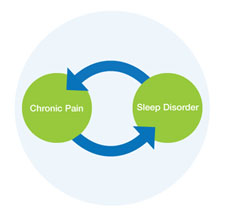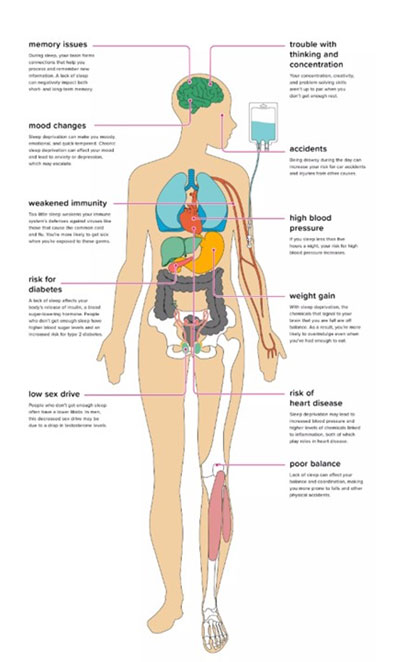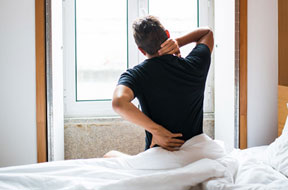The Importance of Getting our ZZZZZs
For those of us who suffer from a poor night’s sleep, we all know that feeling cranky and irritable the next morning is to be expected. But did you know that chronic sleep deprivation can have much more serious and surprising consequences than just impairing our memory and affecting our mood?
Ongoing lack of sleep may put us at increased risk for health problems such as weight gain, anxiety/depression, heart disease, diabetes, stroke and dementia.

Now a recent study shows that even the perception of pain may be heightened for those struggling to get a good night’s rest. Sleep deprivation can lower our threshold to pain and may amplify our reaction to pain by enhancing pain responsivity within the primary sensing region of the brain called the somatosensory cortex.
Simply put:
Sleep could serve as a novel therapeutic target for pain management!

Active Sleep:
Besides getting enough sleep – an ideal range somewhere between 7 and 9 hours a night for adults – the quality of our sleep is just as important. Sleeping is an active process that follows a pattern and alternates between REM (rapid eye movement) and NREM (non-rapid eye movement) sleep throughout a typical night.
NREM (75% of night)
N1 (formerly “Stage1”)
- Transition between wakefulness and sleep
N2 (formerly “Stage 2”)
- Onset of sleep
- Breathing and heart rate are regular
- Body temperature drops (therefore sleeping in a cool room is helpful)
N3 (formerly “Stage 3 and 4”)
- Deepest and most restorative sleep
- Blood pressure drops
- Breathing slows down
- Muscles are relaxed with an increased blood supply to muscles
- Tissue growth and repair occurs
- Hormones vital to growth and development are released
REM (25% of night)
- Dreams typically occur
- Onset about 90 minutes after falling asleep and recurs about every 90 minutes
- Provides energy to brain and body
- Supports daytime performance
- Eyes dart back and forth
- Body becomes immobile
Even though we acknowledge the vital role that sleep plays in our overall health and well-being, actually being able to sleep well – falling asleep and staying asleep throughout the night – remains elusive for millions of Americans.

Here are some tips on how to practice good sleep hygiene:
- Stick to a set schedule: Try and go to bed and wake up at the same time, even on the weekends.
- Exercise daily: Sweating it out during the day will help you fall asleep at night. Timing these workouts to maximize sleep potential – whether in the AM or PM – will vary.
- Create your sleep oasis: Your bedroom should be cool, between 60 and 67 degrees. Try and eliminate light and noise by using blackout curtains, eye shades, ear plugs, “white noise” machines.
- Sleep on a comfortable mattress: If you’ve been sleeping on the same mattress for over 10 years, you may want to consider buying a new one. As for the firmness of the mattress, there’s no right answer. However, there is general consensus among experts that a more firm mattress is better for back pain, while softer mattresses are advisable for tender points.
- Get off the grid: The short-wavelength blue light emitted from electronic devices such as smartphones, laptops and tablets before bed delays your body’s internal clock by suppressing the release of sleep-inducing hormone melatonin. A smarter alternative: try reading a printed book under lamplight to help you unwind.
- Keep it light: Avoid alcohol, caffeine, cigarettes in the evening. If possible, try not to eat heavy meals 2 to 3 hours before bedtime.
- Seek professional help: If you’re still having trouble sleeping, consider speaking with your doctor who may want to evaluate you for other conditions underlying your inability to sleep.
Something To Sleep On
- Sleep deprivation negatively impacts how we look, feel, perform and interact with the world around us.
- Getting a sufficient amount of quality sleep is just as important as eating right and exercising
- While we spend 1/3 of our lives sleeping, optimizing those hours will keep us healthier, happier and more productive the other 2/3 of the time.

Acknowledgement:
Dr. Rosa Cho- Weill Cornell Medicine, Department of Rehabilitation Medicine



Leave a Reply